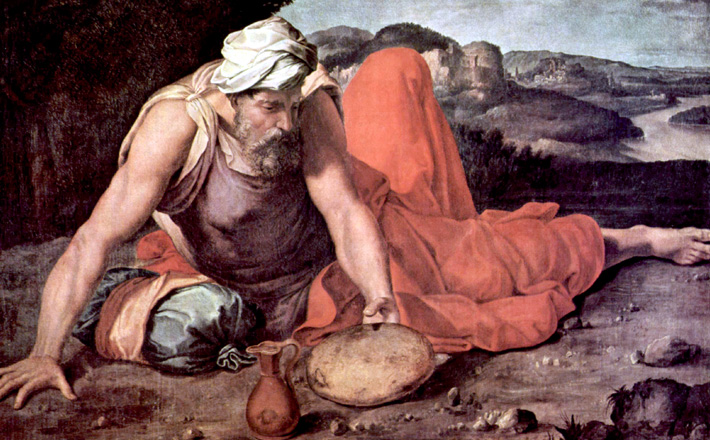Commentary on 1 Kings 19:1-4 [5-7] 8-15a
Elijah is tired, discouraged, suicidal, and God is with the prophet.
Dear Working Preacher, this week is not your typical prophetic narrative. For this week, I encourage you to prayerfully prepare your sermon, while considering those who are really struggling in their journeys.
This week’s narrative begins with Ahab “telling” Jezebel about Elijah’s defiantly violent actions. Based on our understanding of the characters of Ahab and Jezebel, the king is not so much commissioning the queen for action, but really “telling” in a way analogous to a petulant child “telling” on someone in the hopes of action. And of course, Jezebel responds by threatening Elijah.
But this time our heroic prophet reacts in a way quite different from other portrayals. In 1 Kings 18, Elijah was a paradigm of strength and determination against a massive army of Baal prophets. In 1 Kings 21, Elijah defied and frightened the king of Israel. But this week, we see someone that hardly looks like the same man — Elijah is hungry, exhausted, dejected, and even suicidal. “He was afraid; he got up and fled for his life, and came to Beer-sheba” (verse 3; the southernmost major city of Judah in the dry, arid region of the Negev).
Elijah does not “leave on a jet plane,” nor “gets away in fast car.” In ancient Israel, the prophet could only run by foot. Elijah flees in fatigue, hunger, thirst, but afraid for his life, so he did not want to stop. He sleeps poorly, if at all, with constant fear of being waken by pursuing enemies, and arising before dawn to try to get more distance away from the queen. And once arriving in Beersheba, he continues for another day into the wilderness — not an Oregon or Vermont style wilderness, but more like a steppe of the Arizona desert. The prophet is physically and emotionally spent after the days of fleeing. Surely, adrenaline carried him to this place, but he finally needs to sit, and he is spent.
“It is enough; now, O LORD, take away my life, for I am no better than my ancestors” (verse 4).
It is in that spirit of helplessness that God sends an angel to sustain Elijah. And that angel ministers to Elijah for forty days and forty nights at Horeb (interchangeable with Mt. Sinai where Moses met God). The angel provides the basic sustenance of food and water, but more importantly, this provision allows space for Elijah to stand still after the frantic flight from Jezebel.
With forty days of forced rest and retrospection, Elijah is now ready to encounter God. Elijah retreats to a cave where he contends with the divine. It is always amusing how an omnipotent God asks rhetorical questions. In response, God then instructs Elijah to stand before the mountain.
The extended season of contemplation turns to the magnificent. An amazing wind shatters the mountain, followed by an intense earthquake, then a fire, and then a “sound of sheer silence” (verse 12). Perhaps Elijah wanted a miracle, but instead God was not present in the wind, earthquake nor fire. God certainly controls these elements. But the passage instructs us that during difficult, painful times, God is still there, and he reveals himself in silence. We cannot only look for God to come to us in fantastic revelation, but in quietness.
God then repeats the question, “What are you doing here, Elijah?” (verse 13). The prophet gives the exact same response. But at this point, something is different in the prophet who is no longer afraid but has witnessed something miraculous. The Lord instructs him to go.
This passage presents such a radically different view of Elijah. We see the prophet in his humanity like never before and really never again. Although the Bible is often prone to hyperbole, I take his extreme fear, severe depression, and suicidal ideations as they are — accurate and understandable.
This same prophet who boldly stands against kings is now driven to his lowest point, the man of God is still a mere man. But it is only when the prophet is in this weak state, he can find himself is a position to hear God in the stillness in spite of the distracting wind, earthquake and rain. And God is there.
Dear Working Preacher, I pray that you allow this passage to speak to the tired, hungry, exhausted, emotionally spent, and dejected. May your words inspire your community to stop waiting for wind, earthquake, and rain. May you inspire the hurting ones in your community to seek out God in the sheer silence.


June 23, 2013